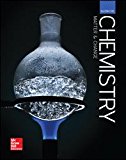
Interpretation:
The reason for most metals to bend when struck but most ionic solids shatter needs to be explained.
Concept introduction:
Ionic solids are hard and brittle whereas metals are malleable and ductile.
Answer to Problem 66A
Metals ions existing in metal move away to take up outside forces and
In case of ionic solids, ionic repulsion causes ionic solid to shatter.
Explanation of Solution
Metal consist of electrons that are arranged in rows and on applying high force they move over one another causing the bend whereas in ionic solid repulsive forces is the main reason causing crystal to shatter.
Chapter 12 Solutions
Glencoe Chemistry: Matter and Change, Student Edition
Additional Science Textbook Solutions
Microbiology with Diseases by Body System (5th Edition)
College Physics: A Strategic Approach (3rd Edition)
Introductory Chemistry (6th Edition)
Anatomy & Physiology (6th Edition)
Microbiology: An Introduction
Chemistry: An Introduction to General, Organic, and Biological Chemistry (13th Edition)
- please find a, b,c, d, e et2o is the solventarrow_forwardHow does the charge of a ligand affect the oxidation state of the metal center? O Positive ligands increase the oxidation state Q • Negative ligands decrease the oxidation state O Only cationic ligands affect the oxidation state O Neutral ligands decrease the oxidation state None of therearrow_forwardWhat are resols and novolaks? Name similarities and differences. How are they synthesized? Show mechanisms! can you solve this question by drawing , thanks!arrow_forward
- major product, or no reaction?stereochemistry where appropriate with the use of wedged or dashed lines. This is a redux reaction. thank you.arrow_forwardWhy is superglue moisture-sensitive? Explain by using reaction equations. hello, can you help me to solve this question. thanksarrow_forwardPlease find A, B, C, D. Et2O is the diethyl etherarrow_forward
 ChemistryChemistryISBN:9781305957404Author:Steven S. Zumdahl, Susan A. Zumdahl, Donald J. DeCostePublisher:Cengage Learning
ChemistryChemistryISBN:9781305957404Author:Steven S. Zumdahl, Susan A. Zumdahl, Donald J. DeCostePublisher:Cengage Learning ChemistryChemistryISBN:9781259911156Author:Raymond Chang Dr., Jason Overby ProfessorPublisher:McGraw-Hill Education
ChemistryChemistryISBN:9781259911156Author:Raymond Chang Dr., Jason Overby ProfessorPublisher:McGraw-Hill Education Principles of Instrumental AnalysisChemistryISBN:9781305577213Author:Douglas A. Skoog, F. James Holler, Stanley R. CrouchPublisher:Cengage Learning
Principles of Instrumental AnalysisChemistryISBN:9781305577213Author:Douglas A. Skoog, F. James Holler, Stanley R. CrouchPublisher:Cengage Learning Organic ChemistryChemistryISBN:9780078021558Author:Janice Gorzynski Smith Dr.Publisher:McGraw-Hill Education
Organic ChemistryChemistryISBN:9780078021558Author:Janice Gorzynski Smith Dr.Publisher:McGraw-Hill Education Chemistry: Principles and ReactionsChemistryISBN:9781305079373Author:William L. Masterton, Cecile N. HurleyPublisher:Cengage Learning
Chemistry: Principles and ReactionsChemistryISBN:9781305079373Author:William L. Masterton, Cecile N. HurleyPublisher:Cengage Learning Elementary Principles of Chemical Processes, Bind...ChemistryISBN:9781118431221Author:Richard M. Felder, Ronald W. Rousseau, Lisa G. BullardPublisher:WILEY
Elementary Principles of Chemical Processes, Bind...ChemistryISBN:9781118431221Author:Richard M. Felder, Ronald W. Rousseau, Lisa G. BullardPublisher:WILEY





